New targets for energy giants after Govt dumps renewables subsidies
HOUSEHOLD power bills would fall by an average $110 to $115 a year from 2020 under what Malcolm Turnbull has described as a “game-changing” plan.
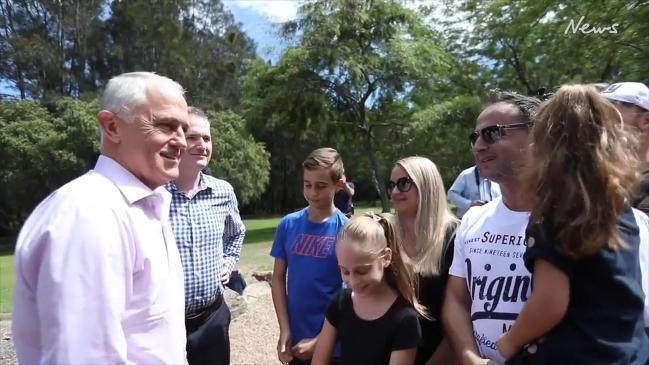
National
Don't miss out on the headlines from National. Followed categories will be added to My News.
- Energy retailers keep consumers in dark to keep profits high
- Libs bank on clean energy move to beat Labor
HOUSEHOLD power bills would fall by an average $110 to $115 a year from 2020 under what Malcolm Turnbull has described as a “game-changing” plan.
In releasing the government’s national energy guarantee, the prime minister said it would deliver affordable and reliable power while cutting emissions.
Earlier, Tony Abbott slammed Mr Turnbull for blocking debate in today’s party room on his new energy policy, which is designed to stabilise the system and drive down household power bills.
The Coalition party room this morning approved the Prime Minister’s National Energy Guarantee, clearing the way for renewable energy subsidies to be dumped and for electricity retailers to face penalties if they don’t meet strict emissions and reliability obligations.
Mr Turnbull shut down debate in the party room over his new energy policy when Mr Abbott tried to express concerns over the strategy.
Mr Abbott lent his cautious support to the policy, but said freedom of speech had been shut down in the party room.
“It’s good that the government has finally accepted that the Clean Energy Target was always a bad idea,” he said.
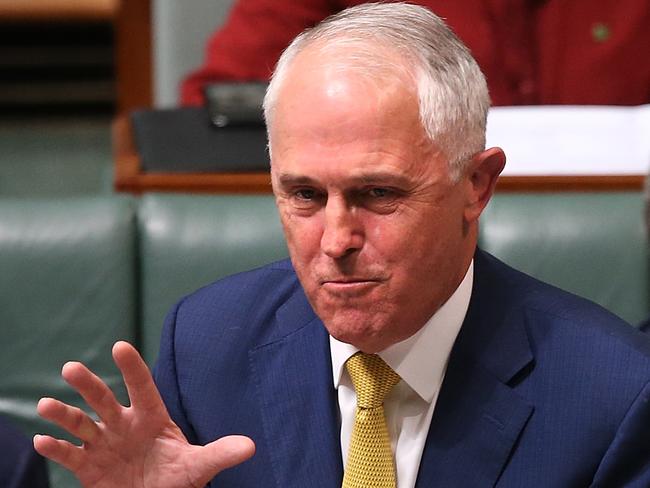
“But Malcolm promised a political discussion in the party room and I’m disappointed that this didn’t go ahead.
“The point I was going to make was that the government had brought forward a good framework but there was a lot that had been left to officials.
“We should sharpen the distinction and make it clear that Labor was for emissions reductions and we were for lower prices by supplementing Snowy 2.0 with Hazelwood 2.0. We had to ensure that Australian coal had a future in Australia by actually getting built a new coal-fired power station”.
Turnbull’s plan includes a reliability guarantee that will be set to deliver the right level of dispatchable (when it’s most required) power - from sources such as coal, gas, pumped hydro and batteries - needed in each state.
The level will be set by the Australian Energy Market Commission and Australian Energy Market Operator, and penalties for retailers missing the guarantee have yet to be determined.
“No more industry policy ... no more favouring one technology after another, but simply ensuring that we have a reliable energy system, that we keep the lights on, that we do so in a way that is affordable and, of course, we meet those international commitments,” Mr Turnbull told reporters today.
An emissions guarantee will be set to meet Australia’s Paris reduction target, requiring legislation to pass parliament and enforced by the Australian Energy Regulator.
The Coalition party room green lit the Turnbull government’s National Energy Guarantee, clearing the way for renewable energy subsidies to be dumped and for electricity retailers to be slugged if they don’t meet strict emissions and reliability guidelines.
Despite concerns raised by former prime minister Abbott and his Nationals colleagues George Christensen and Matt Canavan, the joint party room this morning approved the plan which had gone through Cabinet last night.
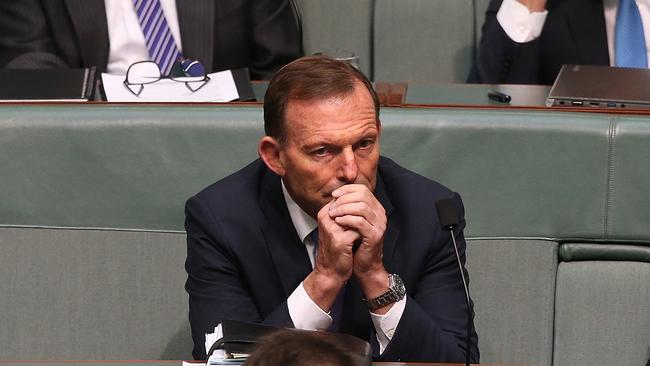
But Coalition sources have told The Daily Telegraph that at the start of the party room meeting this morning, the PM appeared to close down Mr Abbott who is understood to have asked for a “political discussion” on the policy after experts finished speaking at the meeting.
With power prices dominating the political battleground, the policy was unveiled today to Coalition MPs by Energy Minister Josh Frydenberg.
It is designed to lower household electricity bills by between $100 and $115 a year — more than would be achieved by the Clean Energy Target, according to modelling on the policy by the Energy Security Board.
Coalition MPs appeared to support the plan today which is unlikely to require the support of the Senate, making it easier for the government to pass.
Liberal MP Craig Kelly, who chairs the Coalition’s backbench energy committee, this morning said the plan had “a lot of very good points” and that “with a bit more detail to be revealed generally we are in favour of it”.
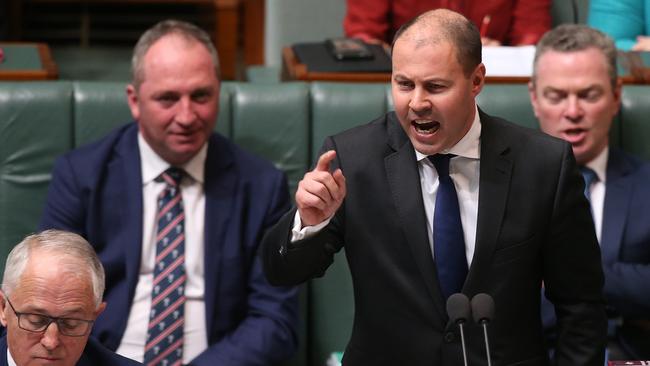
The Daily Telegraph understands the policy, which will begin in 2020, will scrap subsidies for renewables to ensure a level-playing field in the energy sector, while removing penalties for coal to extend its lifespan and stabilise the system.
The Daily Telegraph has learnt that under the policy the retailers will have to meet a reliability quota, to guarantee adequate storage and stability in the system, and a low-emissions quota, to meet Paris commitments by 2030. It is expected to lower prices by boosting supply to the market, pushing wholesale prices down, while improving investment certainty.
MORE: Subscribe to The Daily Telegraph website for just 50c a day
The obligation will be on the energy retailer to meet the reliability and emissions quotas and they could potentially face a penalty, such as a fine or deregistration, if they fail to do so.
Foreign Minister Julie Bishop became the first senior government figure to publicly canvas the policy.
The whole mechanism is geared toward reliability but it ties it to environmental policies, so for the first time we have energy policy and environmental policy working together to guarantee reliability of supply,” Ms Bishop told ABC radio this morning.
“It will make it more affordable and it will also enable us to reduce our greenhouse gas emissions in accordance with our international obligations.”
The National Energy Guarantee, which squarely targets the energy giants, was debated by the energy committee of Cabinet last Wednesday and went to the full Turnbull Government ministry last night.
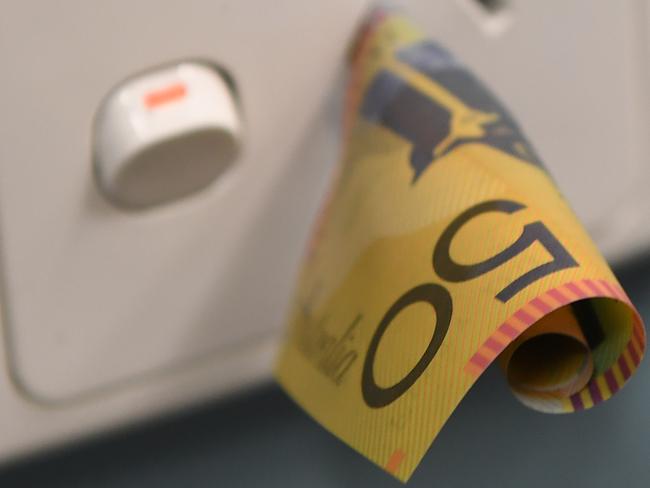
Marginal MPs have fired strong warnings to both Prime Minister Malcolm Turnbull and Mr Frydenberg about ensuring power bills are the centrepiece of any new energy policy, instead of lowering emissions.
And Mr Frydenberg yesterday reassured several concerned colleagues they would be “very happy” with the government’s new policy.
Several senior government sources told The Daily Telegraph the policy would have no certificate schemes, emissions taxes, subsidies or trading schemes, while lowering electricity bills for households.
The change in direction also came after the Nationals rejected the Finkel Clean Energy Target in their Canberra party room on September 11.
The new policy forces renewable energy generators to be more reliable by ensuring there is enough storage — a point Mr Turnbull has been at pains to stress is necessary.
Solar farms are likely to be able to build back-up storage while wind farms will struggle to meet the requirements of the new policy.
Mr Frydenberg has already indicated there may not be need for long-term subsidies for renewable energy. Wind and solar farms will be subsidised under the current Renewable Energy Target until 2030, but no new schemes will be entered into.
Originally published as New targets for energy giants after Govt dumps renewables subsidies


